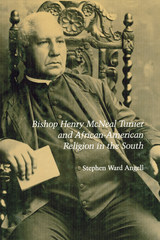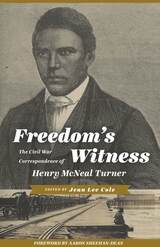2 books about 1834-1915

Bishop Henry Mcneal Turner And African-
Stephen W. Angell
University of Tennessee Press, 1992
Henry McNeal Turner was an "epoch-making man, " as his colleague Reverdy Ransom called him. A bishop in the African Methodist Episcopal Church from 1880 to 1915, Turner was also a politician and Georgia legislator during Reconstruction, U.S. Army chaplain, newspaper editor, prohibition advocate, civil rights and back-to-Africa activist, African missionary, and early proponent of black theology. This richly detailed book, the first full-length critical biography of Turner, firmly places him alongside DuBois and Washington as a preeminent visionary of the postbellum African-American experience. The strength and vitality of today's black church tradition owes much to the herculean labors of pioneers such as Turner, one of the most skillful denominational builders in American history. When emancipation created the prerequisites for a strong national religious organization, Turner, with his boldness, charisma, political wisdom, eloquence, and energy, took full advantage of the opportunity. Combining evangelicalism with forthright agitation for racial freedom, he instigated the most momentous transformation in A.M.E. Church history--the mission to the South. Stephen Angell views Turner's advocacy of ordination for women and his missionary work in Africa as a further outgrowth of the bishop's deep evangelical commitment. The book's epilogue offers the first serious analysis of Turner's theology and his replies to racist distortions of the Christian message.
[more]

Freedom's Witness
The Civil War Correspondence of Henry McNeal Turner
Jean Lee Cole
West Virginia University Press, 2013
In a series of columns published in the African American newspaper The Christian Recorder, the young, charismatic preacher Henry McNeal Turner described his experience of the Civil War, first from the perspective of a civilian observer in Washington, D.C., and later, as one of the Union army’s first black chaplains.
In the halls of Congress, Turner witnessed the debates surrounding emancipation and black enlistment. As army chaplain, Turner dodged “grape” and cannon, comforted the sick and wounded, and settled disputes between white southerners and their former slaves. He was dismayed by the destruction left by Sherman’s army in the Carolinas, but buoyed by the bravery displayed by black soldiers in battle. After the war ended, he helped establish churches and schools for the freedmen, who previously had been prohibited from attending either.
Throughout his columns, Turner evinces his firm belief in the absolute equality of blacks with whites, and insists on civil rights for all black citizens. In vivid, detailed prose, laced with a combination of trenchant commentary and self-deprecating humor, Turner established himself as more than an observer: he became a distinctive and authoritative voice for the black community, and a leader in the African Methodist Episcopal church. After Reconstruction failed, Turner became disillusioned with the American dream and became a vocal advocate of black emigration to Africa, prefiguring black nationalists such as Marcus Garvey and Malcolm X. Here, however, we see Turner’s youthful exuberance and optimism, and his open-eyed wonder at the momentous changes taking place in American society.
Well-known in his day, Turner has been relegated to the fringes of African American history, in large part because neither his views nor the forms in which he expressed them were recognized by either the black or white elite. With an introduction by Jean Lee Cole and a foreword by Aaron Sheehan-Dean, Freedom’s Witness: The Civil War Correspondence of Henry McNeal Turner restores this important figure to the historical and literary record.
[more]
READERS
Browse our collection.
PUBLISHERS
See BiblioVault's publisher services.
STUDENT SERVICES
Files for college accessibility offices.
UChicago Accessibility Resources
home | accessibility | search | about | contact us
BiblioVault ® 2001 - 2024
The University of Chicago Press









